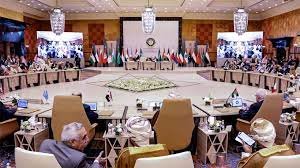The 32nd Arab League Summit held in Jeddah marked a significant moment as all 22 Arab states came together after a span of 12 years. The summit saw the participation of 17 Arab states at the level of heads of state or government, signifying a renewed commitment to regional cooperation. Notably, the summit also witnessed the readmission of Syria into the Arab League and included the presence of the Ukrainian President as a special invitee, adding a unique dimension to the gathering.
The post-summit outcome, known as the “Jeddah Declaration,” stood out for its moderate political optics and pragmatic approach towards addressing the contemporary socio-economic challenges facing the Arab nations. While the Palestinian issue remained a prominent focus, the declaration noticeably refrained from explicitly mentioning Israel by name. Similarly, the summit chose to omit any direct reference to Iran-related matters. Instead, the emphasis was placed on the urgent need to halt foreign interference in the domestic affairs of Arab countries and unequivocally reject all support for the formation of armed groups and militias.
The decision to exclude non-Arab issues, such as Ukraine and the oil market, from the declaration indicated a concerted effort to concentrate on Arab-centric concerns during the summit. This approach aimed to foster unity and coherence within the Arab League, enabling a collective response to the challenges faced by the region.
By welcoming Syria back into the Arab League, the summit acknowledged the evolving dynamics in the Middle East and sought to promote reconciliation and stability. The move represented a significant step towards the reintegration of Syria into the Arab fold, allowing for enhanced dialogue and cooperation on regional issues.
The presence of the Ukrainian President as a special invitee demonstrated the Arab League’s commitment to engaging with external actors and fostering partnerships beyond the Arab world. This inclusion highlighted the importance of cooperation and dialogue in addressing shared challenges and promoting international cooperation.
The Jeddah Declaration underscored the need for pragmatic solutions to the socio-economic difficulties experienced by Arab countries. It acknowledged the pressing nature of these challenges and called for concerted efforts to address them effectively. The declaration recognized the significance of economic development, job creation, and social welfare as key priorities for the Arab nations.
While the pro-Palestinian agenda remained at the forefront, the summit’s moderation in language and approach reflected a nuanced understanding of the geopolitical realities in the region. The omission of explicit references to Israel and Iran-related issues could be seen as a strategic move aimed at maintaining diplomatic channels and exploring avenues for constructive dialogue.
The 32nd Arab League Summit held in Jeddah was a remarkable gathering that saw the reunion of all 22 Arab states after 12 years. The summit’s focus on Arab-centric concerns, the readmission of Syria, and the inclusion of the Ukrainian President as a special invitee demonstrated a commitment to regional cooperation and engagement. The Jeddah Declaration emphasized pragmatic solutions to socio-economic challenges, while the careful handling of sensitive issues reflected a nuanced approach to diplomacy. Overall, the summit marked an important step in strengthening Arab unity and addressing the pressing needs of the Arab world.


